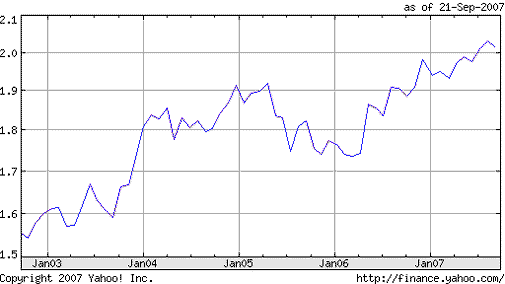Coverage of the weak dollar as it relates to real estate is now front and center. A page 1 story in the New York Times yesterday Dollar Remains at Low Ebb laid it all out.

Until a few years ago, my family and I would go skiing over Christmas break every year to either Mont Tremblant or Mt Orford in Canada. It felt free (and cold) because the exchange rate made the cost about 1/2 that of going to Vermont. With 4 sons, 3 of whom are teenagers, the food costs alone were staggering (important note: Kentucky Fried Chicken (KFC) in Quebec is known as PFK.)
Now, the exchange rate between US and Canadian dollars are at parity. The exchange rate with the British Pound is two to one and the Euro is 41% higher than parity.

On Wednesday, I posted (after a 2 month hiatus) my Three Cents Worth column on Curbed which specifically addressed the weak dollar. Because of my Curbed chart, I was interviewed on the WNYC’s The Brian Lehrer Show yesterday. The segment was called: Following Up: Are Foreigners Propping up House Prices? Note: The interview starts at the 3 minute mark.

Also on Friday, a portion of the text of my radio interview on BBC News Worldwide was published on their web site in Investors see Manhattan as a safe haven. Here’s the web page and the audio version. From some of the commentary made by the other guests, you can hear the front line observations and confusions about the impact of the weak dollar.
Will we ever get change back from our dollar?
One Comment
Comments are closed.



Putting my money where my big mouth is: I just had my family in Greece convert an account in which they held dollars into euro.
The dollar’s fate has been sealed by the rate cuts Bernanke & Co. have in store. The next Russian Roulette Special is “Lenders vs. Consumers”: will the government let nature take its course (you know, with that vaunted free market they have preached about to us till our ears bled), allow homeowners to walk away from houses they can’t afford, and let the lenders (“investors”) take it in the chin? Or will they throw away good money after bad, and attempt a bailout of epic proportions which will further erode federal and state fiscal conditions and force borrowers to stay in those overpriced homes, unable to consume because their income is earmarked for crushing mortgage payments?
By the way, the Japanese refused to take their pain in the 1990s in much the same way, and their refusal to mark down bad loans has cost them over 15 years of flat economic growth and given them government debt which, when compared to GDP, is of Argentine proportions.